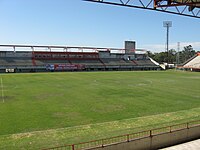sport.wikisort.org - Team
Nova Iguaçu Futebol Clube, or Nova Iguaçu as they are usually called, is a Brazilian football team from Nova Iguaçu in Rio de Janeiro, founded on April 1, 1990.
 | ||||
| Full name | Nova Iguaçu Futebol Clube | |||
|---|---|---|---|---|
| Nickname(s) | Carrossel da Baixada | |||
| Founded | 1 April 1990 | |||
| Ground | Estádio Jânio Moraes | |||
| Capacity | 5,000 | |||
| President | Jânio Moraes | |||
| Head coach | Hermes Junior | |||
| League | Campeonato Carioca | |||
| 2020 | Carioca, 16th | |||
| Website | Club website | |||
| ||||



Nova Iguaçu greatest rival is from the same city: Artsul.
Home stadium is the Jânio Moraes stadium, capacity 16,000. They play in orange shirts, white shorts and orange socks.
History
Nova Iguaçu Futebol Clube was founded on April 1, 1990, by the initiative of 25 self-employed persons, led by Jânio Moraes. The foundation project was idealized in 1988/1989, by Jânio Moraes, and supported by the 25 self-employed people.[1] 1994 World Cup champion Zinho is one of the founders of the club and was a director-partner of the club.[2]
In 1994, only four years after the club's foundation, Nova Iguaçu won the Campeonato Carioca Third Level, and gained promotion to the state championship second level.[3]
In 2005, after a successful campaign, Nova Iguaçu won the Campeonato Carioca Second Level and was promoted to the 2006 Campeonato Carioca First Division.[4]
On January 14, 2006, Nova Iguaçu played their first ever Campeonato Carioca first division match, against the major club Flamengo, at Estádio Raulino de Oliveira, where the club won 1-0. However, Flamengo's players were youngsters.[5]
On June 21, 2008, the club won the Copa Rio for the first time, after beating Americano 3-2 at Estádio Godofredo Cruz, Campos dos Goytacazes, home of the opponent club.[6]
Achievements
Major competitions
- Copa Rio:
- Winners (2): 2008, 2012
- Campeonato Carioca First Level:
- Troféu Edílson Silva de 2012
- Campeonato Carioca Série A2:
- Winners (3): 2005, 2016, 2020
- Campeonato Carioca Série B1:
- Winners (1): 1994
Other competitions
- Copa João Ellis Filho:
- Winners (1): 2005
- Olimpíada da Baixada Fluminense:
- Winners (1): 2005
- Campeonato Iguaçuano:
- Winners (1): 2005
- Segundo Turno do Estadual de Profissionais do Módulo Especial:
- Winners (1): 1996
- Primeiro Turno de Profissionais da Série Intermediária:
- Winners (1): 1995
Youth competitions
- Volta Redonda Youth Tournament:
- Winners (1): 1991
- Torneio Otávio Pinto Guimarães de Juniores:
- Winners (1): 1996
- Juniores da Série Intermediária:
- Winners (1): 1995
- AERJ Youth Championship:
- Winners (1): 1992
Stadium

Nova Iguaçu's home stadium is Estádio Jânio Moraes, also known as Estádio Laranjão, inaugurated in 2009, with a maximum capacity of 5,000 people.
Nova Iguaçu's previously home stadium was Estádio Giulite Coutinho,[7] also known as Estádio Édson Passos, inaugurated in 2000, with a maximum capacity of 16,000 people.[8]
Players
First team squad
- As of February 23, 2022
Note: Flags indicate national team as defined under FIFA eligibility rules. Players may hold more than one non-FIFA nationality.
|
|
Out on loan
Note: Flags indicate national team as defined under FIFA eligibility rules. Players may hold more than one non-FIFA nationality.
|
|
Club colors and nickname
The club is affectionately known as "Carrossel da Baixada" (Baixada's Carrousel), in reference to the team color (orange), similar to the color of the Netherlands' 1974 World Cup team (known as the Dutch Carrousel).[9] The color adopted by the club was orange, in honor to the period (in the 1930s) when Nova Iguaçu city was one of the biggest orange exporters in the world (the fruit still is one of the city symbols).[1]
References
- "Nova Iguaçu Futebol Clube, nascido para brilhar" (in Portuguese). Nova Iguaçu Futebol Clube official website. Retrieved May 25, 2008.[permanent dead link]
- "Zinho estréia no Nova Iguaçu neste sábado" (in Portuguese). Terra. Retrieved May 25, 2008.
- "Rio de Janeiro - List of Champions Third Level". RSSSF Brasil. Archived from the original on June 2, 2008. Retrieved May 25, 2008.
- "Rio de Janeiro State League 2005 - 2nd level". RSSSF Brasil. Archived from the original on June 2, 2008. Retrieved May 25, 2008.
- "Flamengo perdeu a única partida que fez contra o Nova Iguaçu" (in Portuguese). O Globo. Retrieved May 25, 2008.
- "Nova Iguaçu em festa". Lance!. Rio de Janeiro: Areté Editorial S/A (3871): 12. 2008.
- "Nova Iguaçu Futebol Clube" (in Portuguese). FFERJ official website. Archived from the original on May 16, 2008. Retrieved May 25, 2008.
- "Estádio Giulite Coutinho" (in Portuguese). América Football Club official website. Archived from the original on April 24, 2008. Retrieved 2008-05-25.
- "Aldeense é campeão carioca de futebol" (in Portuguese). São Pedro da Aldeia City Hall. Retrieved May 25, 2008. [dead link]
External links
- (in Portuguese) Official Website
На других языках
- [en] Nova Iguaçu FC
[es] Nova Iguaçu Futebol Clube
El Nova Iguaçu Futebol Clube es un equipo de fútbol de Brasil que juega en el campeonato Brasileño de Serie D, la cuarta división nacional; y en el Campeonato Carioca, la primera división del estado de Río de Janeiro.[ru] Нова-Игуасу (футбольный клуб)
«Нова-Игуасу» (порт.-браз. Nova Iguaçu Futebol Clube) — бразильский футбольный клуб представляющий одноимённый город из штата Рио-де-Жанейро. В 2022 году клуб выступал в Серии D Бразилии.Другой контент может иметь иную лицензию. Перед использованием материалов сайта WikiSort.org внимательно изучите правила лицензирования конкретных элементов наполнения сайта.
WikiSort.org - проект по пересортировке и дополнению контента Википедии